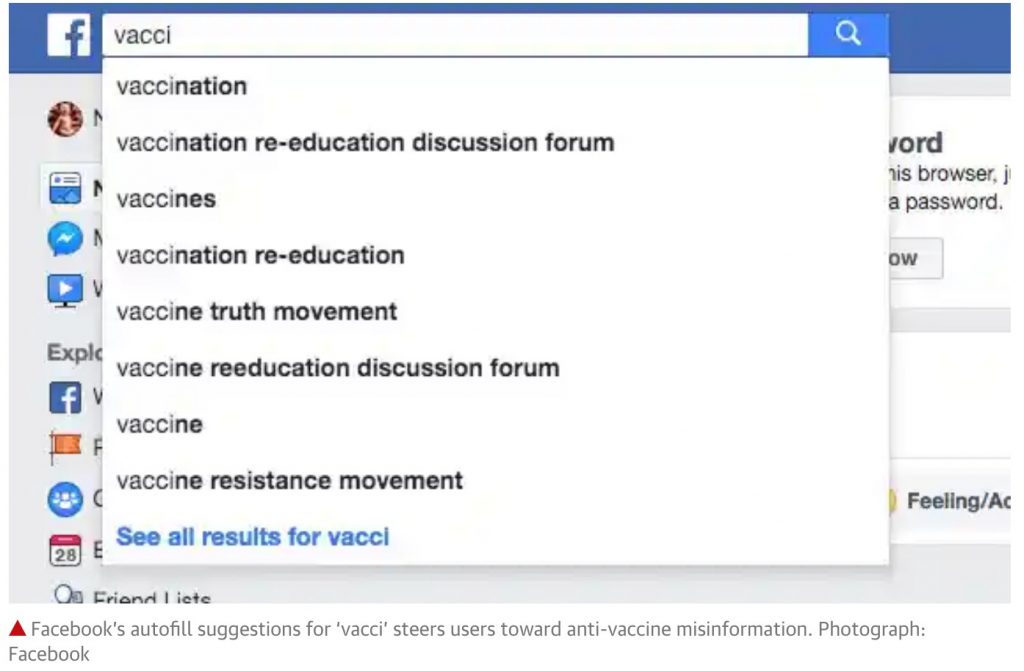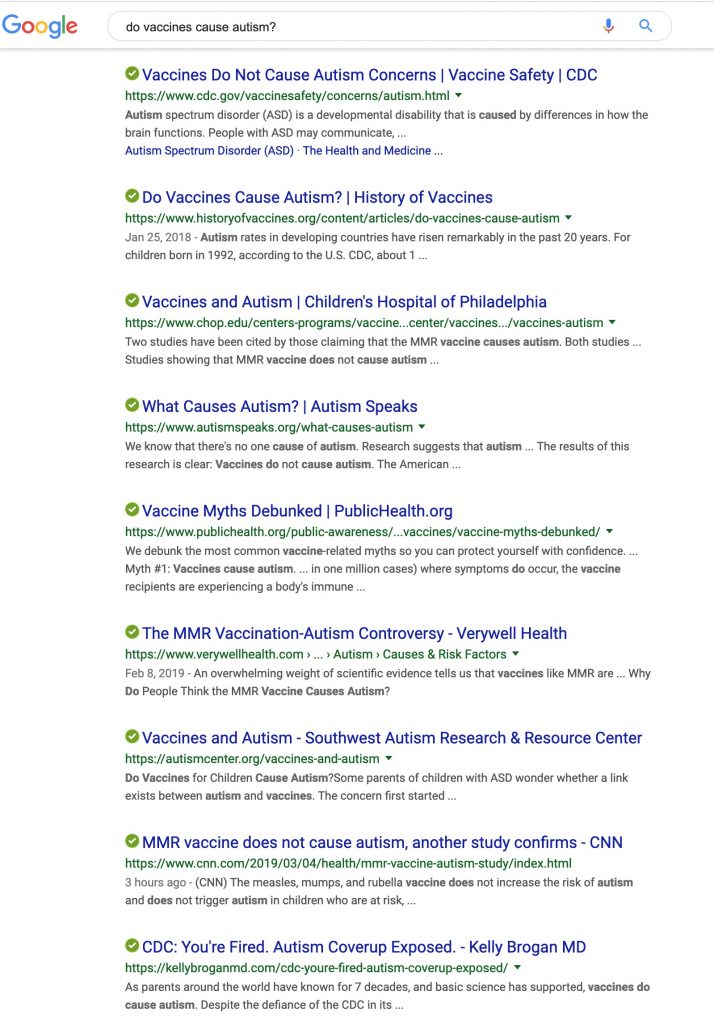Small Victories in the War on Internet Disinformation
Congressman Adam Schiff of California scored a small victory in the war on the spread of fake information over the Internet last week. In response to a letter from the Congressman to Jeff Bezos, Amazon removed conspiracy nut documentaries alleging a link between vaccines and autism from the Prime Video streaming service.
Schiff’s letter follows a news report by CNN showing that Amazon had been recommending conspiracy nut docos in response to innocuous searches for information on vaccines:
A recent search for “vaccine” on Amazon (AMZN) yielded a search page dominated by anti-vaccination content. Of the 18 books and movies listed on the search page, 15 contained anti-vaccination content…But perhaps more disturbing from a public health and misinformation perspective, there were also books that people simply searching for information — new parents, for instance — could mistake for something offering neutral information accepted by the public health community, like “Miller’s Review of Critical Vaccine Studies: 400 Important Scientific Papers Summarized for Parents and Researchers” and “The Vaccine-Friendly Plan: Dr. Paul’s Safe and Effective Approach to Immunity and Health — from Pregnancy Through Your Child’s Teen Years,” both of which featured Amazon’s “Best Seller” tag.
Feeding the hunger of confirmed conspiracy nuts for well known documentaries (such as Vaxxed) confirming their mistaken beliefs may be excusable, but steering new parents down the path to nuttery is a much more serious issue, of course.
YouTube has Responded, but not Facebook
This isn’t Schiff’s first effort at cleaning up the Internet: a previous letter to Google and Facebook produced mixed results. That letter was prompted by a Guardian report on promotion of false information by the two dominant platforms.
The Guardian found that Facebook and YouTube auto-complete options for simple searches on “vacci” returned suggestions for anti-vax conspiracy pages and videos. For example:
YouTube quickly announced changes in its recommendation engine, especially in the playlists it constructs automatically each time you view a video:
YouTube will recommend fewer videos that “could misinform users in harmful ways”, the company announced on Friday, in a shift for a platform that has faced criticism for amplifying conspiracy theories and extremism.
The change concerns YouTube’s recommendations feature, which automatically creates a playlist of videos for users to watch next. The recommendations are the result of complex and opaque algorithms designed to capture a user’s interest, but they have become a locus of criticism when YouTube directs people to potentially harmful and false content that they would not have otherwise sought out.
But Facebook is still thinking about the anti-vax misinformation problem, even though Mark Zuckerberg’s wife Priscilla Chan is a pediatrician acutely aware the danger to public health caused by these anti-science conspiracies.
Internet Business Models Have Real World Effects
The US has already seen more measles outbreaks this year – 159 – than we had in all of 2017. And since 2001, the percentage of completely unvaccinated children has quadrupled:
A 2017 CDC analysis found more than 90% of toddlers had received most recommended vaccines, and only 1.3% of children born in 2015 had received none of the 14 recommended early-childhood vaccinations—a quadrupling from the 0.3% figure in 2001, but still a tiny fraction. (The refusal rate is higher in some geographical pockets, several of which are now battling measles outbreaks.)
This isn’t simply a US problem: measles is on the rise globally, and it’s not the “harmless childhood disease” some claim.
But measles is far more common around the world — the World Health Organization said it claimed 110,000 lives in 2017. The WHO says there’s been a 30 percent increase in measles cases in recent years. Unvaccinated Americans traveling abroad, or foreign visitors here, can easily bring in the virus.
For example, a huge outbreak in Madagascar has caused more than 68,000 illnesses and 900 deaths since September. But you don’t need to go as far as Madagascar — common tourist destinations like England, France, Italy and Greece had measles outbreaks last year, noted CDC’s Dr. Nancy Messonnier. Nearly 83,000 people contracted measles in Europe in 2018, the highest number in a decade.
And it’s not a new problem for the Internet mega-platforms. Evgeny Morozov has been complaining about Google’s pro-conspiracy bent since 2012, jumping off from Anna Kata’s academic research on the anti-vaccination movement – “Anti-vaccine activists, Web 2.0, and the postmodern paradigm – An overview of tactics and tropes used online by the anti-vaccination movement” – published in the journal Vaccine.
The Google search algorithm gives more weight to popularity than to authority and veracity. This “post-modernist” bent inevitably drives conspiracy theories, emotional attachments, and passionate beliefs to the top of the list because they make more money for companies striving for engagement.
Meaningful Action has Taken a Long Time
Following Morozov’s criticism that Google was more more likely to suggest to users that vaccines cause autism than they they don’t, the company vowed to reform its search algorithm. After years of no apparent change, it did finally begin producing better results a year or two ago. Today, eight of the top nine results for “do vaccines cause autism?” are legitimate scientific sources, with conspiracy theorist Kelly Brogan in last place:
It’s unclear, however, whether Google reformed its algorithm on the whole or simply patched it to stop returning embarrassing results on this one query. And as the recent activity on YouTube suggests, the problem is actually more widespread than search.
Facebook Organizes Harassment Campaigns
While YouTube plays a strong role in the mis-education of consumers on vaccines and other medical subjects – it’s often called “YouTube University” for this role – nothing tops Facebook for organizing harassment campaigns. Audiences at meetings of the CDC’s Advisory Committee on Immunization Practices (ACIP) and Congressional hearings are now dominated by anti-vaxxers.
Organized campaigns to harass proponents of vaccines form on Facebook pages run by a small number of people:
Just seven anti-vax pages generated nearly 20 percent of the top 10,000 vaccination posts in this time period: Natural News, Dr. Tenpenny on Vaccines and Current Events, Stop Mandatory Vaccination, March Against Monsanto, J. B. Handley, Erin at Health Nut News, and Revolution for Choice.
Washington naturopath Elias Kass became a victim of one such campaign after testifying on the recent measles outbreak in Washington state:
Kass faced some anger in the hallway after the hearing, he said, with one person calling him “a disgusting liar”. But it wasn’t until several hours later that “the shit hit the fan”. That’s when Kass realized that his Facebook page was being flooded with one-star reviews calling him everything from a “disgrace” and a “pedophile” to a “Nazi pharma shill” and “scumbag shilling for infanticide”. Kass disabled the Yelp-like reviews feature on the page, but that didn’t stop the onslaught, which moved into the page’s comments and across the ecosystem of anti-vaxx Facebook pages and groups. By Monday, five days after his brief testimony, he had compiled a photo gallery with hundreds of screenshots of abusive comments.
The campaign against Kass was organized by Erin Elizabeth (“Health Nut News”) and Ken Cook (“Stop Mandatory Vaccines”). While Yelp protects businesses from harassment campaigns, the rudimentary Google Maps “review” feature does not. Hence, harassment campaigns carried out by members of Facebook groups can have lasting effects. Victims say Facebook could provide them with protection of such attacks short of banning the offending groups altogether:
“It seems to me that it would take Facebook about 10 minutes to allow us to ban or block every member of Sherri Tenpenny’s group,” he said. “I have no problem with them wanting to stay in their echo chambers, but this is the digital equivalent of 39,000 people storming into our waiting room and screaming at us and our patients.”
One wonders why this hasn’t already happened; perhaps Facebook is simply too busy with all the other problems the company faces.
The Enemy is Less Powerful Than it Appears
The business models of Google, Facebook, and Amazon have given rise to anti-social online mobs hell bent on the destruction of mainstream voices in science and technology policy. While some firms are finally beginning to take steps to curb this destructive tendency, the Internet has a long way to go in dealing with the “wisdom of crowds” organized around false beliefs.
We need better social media search and moderation tools more than full censorship of offensive viewpoints. And we need policy makers to show the political courage to stand up to these mobs.
The Internet’s organizing tools make it easy for a handful of activists to appear to lawmakers used to traditional media as a much larger group than they really are. While there are thousands of anti-vaxxers in the US, they’re too dispersed to make a difference in any Congressional election. Nobody has ever lost a seat in Congress for being in favor of vaccination.
Humble Acts of Heroism
Colorado is a hotbed of anti-vaccine sentiment, relatively speaking; newly-elected progressive governor Jared Polis threatens to veto efforts to curtail vaccine exemptions. Despite the lack of leadership on the governor’s part, Colorado Congresswoman Diana DeGette held an Energy and Commerce hearing last week on the efficacy of vaccines and the growing threat to public health of vaccine refusal.
Tomorrow, the Senate will hold its own vaccine hearing on the subject, “Vaccines Save Lives: What Is Driving Preventable Disease Outbreaks?” in the Health, Education, Labor, and Pensions committee. The Senate hearing features a special witness, Ethan Lindenberger, an 18-year-old high schooler who got himself fully vaccinated as soon as he was old enough to overcome parental objections. I’m looking forward to the questions raised by Ranking Member Patty Murray given that her state (Washington) is populated by the same kinds of people as Colorado.
People like DeGette and Lindenberger are little points of light in the dark night of search engine optimization. Their success will depend on the willingness of millions of ordinary people to join their fight for reality-based public policy.
UPDATE: On Thursday, March 7th Facebook announced it will finally take steps to reduce the visibility and eliminate the profitability of anti-vaccine pages on its platform:
- We will reduce the ranking of groups and Pages that spread misinformation about vaccinations in News Feed and Search. These groups and Pages will not be included in recommendations or in predictions when you type into Search.
- When we find ads that include misinformation about vaccinations, we will reject them. We also removed related targeting options, like “vaccine controversies.” For ad accounts that continue to violate our policies, we may take further action, such as disabling the ad account.
- We won’t show or recommend content that contains misinformation about vaccinations on Instagram Explore or hashtag pages.
- We are exploring ways to share educational information about vaccines when people come across misinformation on this topic.
Thank you, Facebook.





